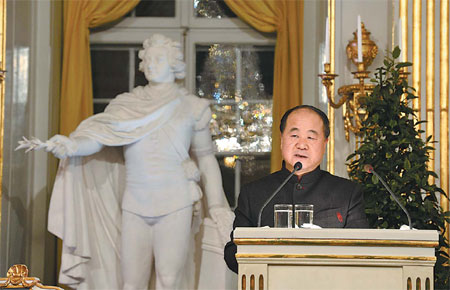

 |
|
Mo Yan talks about his mother, hometown and controversy surrounding his selection as a Nobel winner on Friday. Jonas Ekstromer / Scanpix Sweden / AFP |
The night before the Nobel Laureate picked up the medal from the King, Mo Yan spoke to young Swedish students in a cinema, before the show of Red Sorghum, the movie in 1987 that made his international fame for the first time.
He said watching old movie remind him of youth. "If I can give up all the awards and get back to youth, I would like to do that."
After it was announced that he was awarded the Nobel Prize, a picture with him and the film crew spread widely on the Internet in China. In the picture, three man, including Zhang Yimou, the director, Jiang Wen, the actor, and Mo himself, stand with naked chest beside Go Li, the actress.

Designer unveils Mo Yan's dressing code
Mo said the photo was taken 25 years ago in the courtyard of his house in Gaomi, Shandong province. They were all young at the time. Zhang, 35, was the oldest; Gong, 21, was still a college student.
"We all turned old now," said Mo. "At that time we were not famous. Now we are all famous, but old," he said.
"I am no longer able to write a fiction like the Red Sorghum, and Zhang can never make such a movie again."
Zhang paid him 800 yuan for the copyright of the fiction, and that made him feel rich at the time. "In my hometown I could trade that money for a cow. I feel very happy that I could trade a cow with a story."
He said the movie cost 600,000 yuan, and now Zhang's movies all cost hundreds of millions. "The 600,000 yuan movie became a classic. His movies now, though cost hundreds of millions, are being criticized."
He said characters in the Red Sorghum were fearless in their pursuit of freedom, and that met the spiritual demand of the Chinese people in the 1980s, therefore it was an immediate hit. "I say with proud that the movie was successful because I wrote the fiction well," he said.
Hokan Friberg, a Swedish teacher of Chinese, said he watched the movie in 1988 and was surprised. "Before that I thought all Chinese movies were boring, and this movie changed that impression." Friberg said Mo's story, as well as the cinematographer and the directing, made the movie stand out at the time.
 |
Friberg said they started to talk about Mo's work at the Chinese class he teaches after the Nobel Prize.
"Maybe I will read his book in the future," said Hannes Snndin, a 16-year-old Swedish student, who started to learn Chinese from last semester.
The movie, however, did not resonate the same excitement with young people today. "It is a bit slow," said Herman Hojsgaard, another 16-year-old Swedish boy, after watching it.



